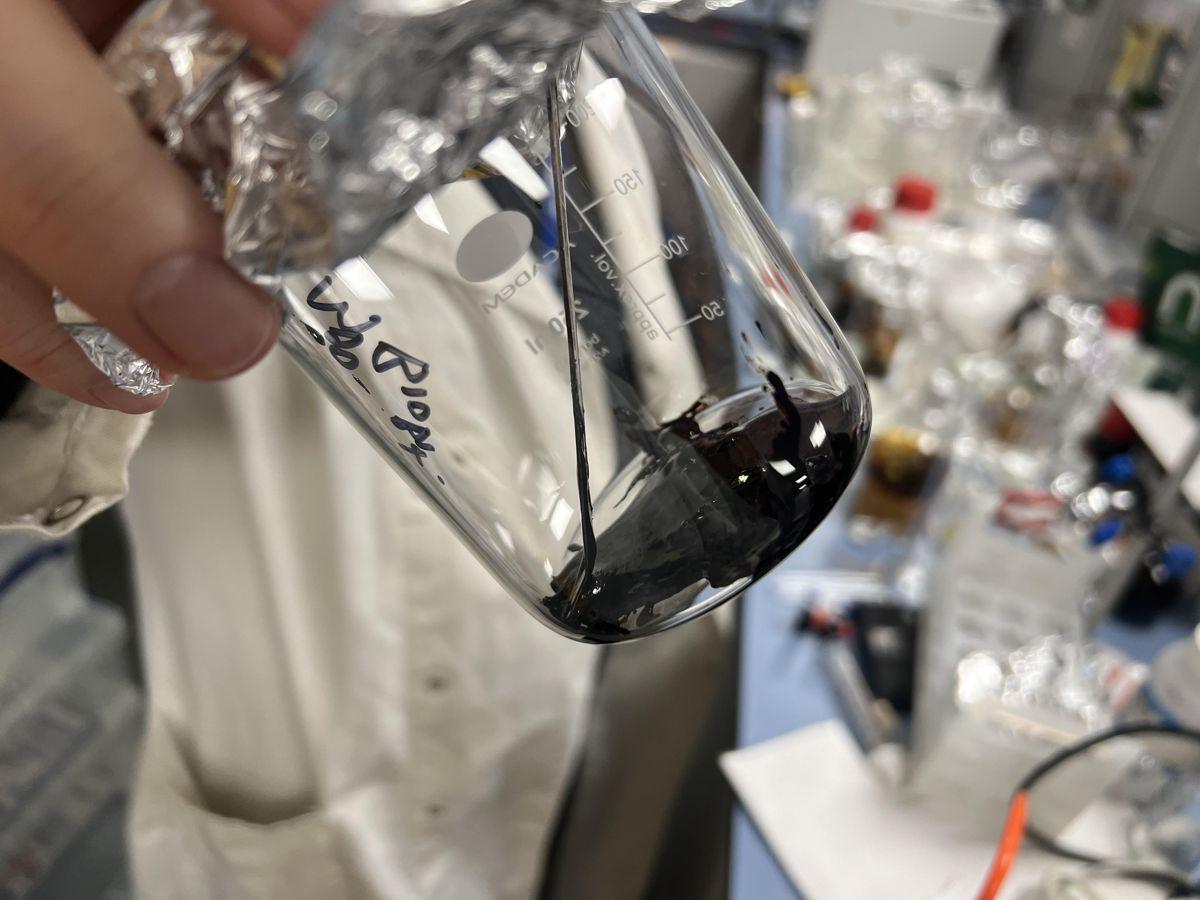Lowering Carbon Emissions with Bitumen produced from Algae
 17/07/24-FR-English-NL-footer
17/07/24-FR-English-NL-footer
Réduire les émissions de carbone grâce au bitume produit à partir d’algues
 Image- Tarmac
Image- Tarmac
Un partenariat de recherche dirigé par la société d'élimination du carbone CO2CO Ltd vise à révolutionner la construction routière avec une approche nouvelle et à faible émission de carbone pour produire du bitume à partir d'algues. Si elle est étendue avec succès, cette innovation pionnière pourrait encore améliorer la durabilité de la construction routière.
Tarmac, la principale entreprise britannique de matériaux de construction durables, s'est associée à CO2CO Ltd, Nanolyse Technologies Ltd, une entreprise d'innovation en matériaux durables, l'Imperial College de Londres, l'Université de Sheffield et d'autres leaders de l'industrie de l'asphalte sur ce projet de recherche.
L’équipe développe une nouvelle méthode qui utilise les algues comme source de biomasse pour produire du « biobitume ». Cela transforme la biomasse d'algues en un matériau noir, visqueux et hydrofuge qui ressemble au bitume dérivé du pétrole mais offre une réduction significative du carbone.
Tarmac effectuera des tests en laboratoire en direct du matériau dans ses installations techniques d'Ettingshall. Bien qu’à un stade précoce de développement, ce bitume innovant d’origine naturelle pourrait être utilisé pour la production en grand volume de différentes qualités de biobitume répondant aux normes de l’industrie britannique s’il était étendu. La phase suivante consiste à faire progresser le développement du produit vers des niveaux de maturité technologique plus élevés, où l'équipe développera et validera davantage le produit dans des environnements pertinents.
Tim Smith, directeur technique régional (Sud-Est) chez Tarmac, a déclaré : « Tarmac s'engage à réduire les émissions de carbone dans tous les domaines de notre activité, y compris la construction et le resurfaçage des routes. La nécessité d’explorer de nouvelles innovations et alternatives aux matériaux traditionnels est plus importante que jamais.
« Les premières recherches ont montré que le biobitume dérivé d'algues pourrait être une alternative très viable au processus énergivore de la production traditionnelle de bitume. Il offre les mêmes propriétés mais permet d’importantes économies de carbone par rapport au bitume dérivé du pétrole. Cependant, pour maximiser les avantages environnementaux, nous devons également effectuer des tests et un développement approfondis pour garantir que ces nouveaux biobitumes sont aussi durables et recyclables que possible, et n'affectent pas les performances de l'asphalte fini.
Philip Slaughter, PDG de CO2CO Ltd, a commenté : « Découvrir et comprendre le potentiel du biobitume a été une aventure passionnante pour toutes les personnes impliquées. Le soutien actif d'Innovate UK et de Tarmac a permis cette recherche et cette innovation collaboratives. L’équipe comprenait certains des plus grands experts britanniques en biologie, science, ingénierie, commerce et industrie.
« Ensemble, ils ont mis au point un produit novateur et durable qui pourrait réduire considérablement les émissions de carbone dans le secteur de la construction. Nous sommes ravis de continuer à approfondir nos relations avec des partenaires universitaires et industriels alors que nous poursuivons notre travail pour décarboner notre biosphère.
Le Dr Seetharaman Vaidyanathan de l'Université de Sheffield a déclaré : « L'émergence d'une application pratique qui exploite la capacité des algues à séquestrer le dioxyde de carbone est vraiment passionnante. Nous prévoyons de nouveaux développements dans ce domaine et sommes fiers de contribuer à cet effort innovant.
Le professeur Mark Sephton de l'Imperial College de Londres a déclaré : « Notre biobitume est un matériau collant doté de propriétés viscoélastiques qui donnent naissance à des caractéristiques uniques qui font de ce matériau un liant idéal pour les granulats dans la production d'asphalte. »
Le Dr Imad Ahmed, PDG de Nanolyse Technologies Ltd, a ajouté : « Nous n’avons fait qu’effleurer la surface des applications potentielles de notre matériau biobitume. Notre capacité à affiner la structure chimique et les propriétés viscoélastiques de ce matériau fournit des solutions durables pour diverses applications industrielles, notamment la construction, la gestion des déchets, la catalyse et l’agriculture.
NJC.© Info Tarmac
-------------------------------------------------------------------------------------------------------------
 17/07/24-English
17/07/24-English
Lowering Carbon Emissions with Bitumen produced from Algae
 Image- Tarmac
Image- Tarmac
A research partnership led by carbon removal company CO2CO Ltd aims to revolutionise road construction with a novel, lower-carbon approach to producing bitumen from algae. If successfully scaled up, this pioneering innovation could further enhance the sustainability of road construction.
Tarmac, the UK’s leading sustainable construction materials company, has partnered with CO2CO Ltd, Nanolyse Technologies Ltd, a sustainable materials innovations company, Imperial College London, the University of Sheffield, and other asphalt industry leaders on this research project.
The team is developing a new method that uses algae as a biomass source material to produce ‘bio-bitumen’. This transforms algae biomass into a black, viscous, water-repellent material that resembles petroleum-derived bitumen but offers a significant carbon reduction.
Tarmac will complete live laboratory testing of the material at its technical facilities in Ettingshall. Although at an early stage of development, this innovative, nature-based bitumen could be used for large-volume production of different grades of bio-bitumen that meet UK industry standards if scaled up. The next phase is to advance product development to higher technology readiness levels, where the team will further develop and validate the product in relevant environments.
Tim Smith, regional technical manager (South East) at Tarmac, said: “Tarmac is committed to reducing carbon emissions across all parts of our business, including road building and resurfacing. The need to explore new innovations and alternatives to traditional materials is more important than ever.
“Early-stage research has shown that the bio-bitumen derived from algae could be a very viable alternative to the energy-intensive process of traditional bitumen production. It provides the same properties but offers significant carbon savings when compared to petroleum-derived bitumen. However, to maximise the environmental benefits, we also need to complete thorough testing and development to ensure these new bio-bitumens are as durable and recyclable as possible, and do not affect the performance of the finished asphalt material.”
Philip Slaughter, CEO at CO2CO Ltd, commented: “Discovering and understanding the potential of bio-bitumen has been an exciting journey for everyone involved. Active support from Innovate UK and Tarmac enabled this collaborative research and innovation. The team comprised some of the UK’s leading biology, science, engineering, business, and industry experts.
“Together, they unlocked a novel, sustainable product that could materially reduce carbon emissions in the construction industry. We are thrilled to continue deepening our relationships with academic and industry partners as we continue our work to decarbonise our biosphere.”
Dr Seetharaman Vaidyanathan at the University of Sheffield said: “The emergence of a practical application that leverages the ability of algae to sequester carbon dioxide is truly exciting. We anticipate further developments in this field and are proud to contribute to this innovative endeavour.”
Professor Mark Sephton of Imperial College London said: “Our bio-bitumen is a sticky material with viscoelastic properties which give rise to unique characteristics that make this material an ideal binder for aggregates in the production of asphalt.”
Dr Imad Ahmed, CEO at Nanolyse Technologies Ltd, added: “We’ve only scratched the surface with the potential applications of our bio-bitumen material. Our ability to fine-tune this material’s chemical structure and viscoelastic properties provides sustainable solutions for various industrial applications, including construction, waste management, catalysis, and agriculture.”
NJC.© Info Tarmac
----------------------------------------------------------------------------------------------------------------
 17/07/24-NL
17/07/24-NL
Verlaging van de koolstofemissies met bitumen geproduceerd uit algen
 Image- Tarmac
Image- Tarmac
Een onderzoekspartnerschap onder leiding van het koolstofverwijderingsbedrijf CO2CO Ltd heeft tot doel een revolutie teweeg te brengen in de wegenbouw met een nieuwe, koolstofarmere aanpak voor de productie van bitumen uit algen. Als deze baanbrekende innovatie succesvol wordt opgeschaald, kan deze de duurzaamheid van de wegenbouw verder vergroten.
Tarmac, het toonaangevende bedrijf op het gebied van duurzame bouwmaterialen in Groot-Brittannië, werkt voor dit onderzoeksproject samen met CO2CO Ltd, Nanolyse Technologies Ltd, een bedrijf dat innovaties op het gebied van duurzame materialen uitvoert, Imperial College London, de Universiteit van Sheffield en andere leiders uit de asfaltindustrie.
Het team ontwikkelt een nieuwe methode waarbij algen als biomassabronmateriaal worden gebruikt om ‘biobitumen’ te produceren. Hierdoor wordt de biomassa van algen omgezet in een zwart, stroperig, waterafstotend materiaal dat lijkt op bitumen uit aardolie, maar een aanzienlijke koolstofreductie biedt.
Tarmac zal live laboratoriumtests van het materiaal uitvoeren in zijn technische faciliteiten in Ettingshall. Hoewel dit innovatieve, op de natuur gebaseerde bitumen zich in een vroeg ontwikkelingsstadium bevindt, zou het bij opschaling kunnen worden gebruikt voor grootschalige productie van verschillende soorten biobitumen die voldoen aan de Britse industrienormen. De volgende fase is het bevorderen van de productontwikkeling naar een hoger technologiegereedheidsniveau, waarbij het team het product verder zal ontwikkelen en valideren in relevante omgevingen.
Tim Smith, regionaal technisch manager (Zuidoost) bij Tarmac, zei: “Tarmac streeft ernaar de CO2-uitstoot in alle onderdelen van ons bedrijf te verminderen, inclusief de aanleg van wegen en het vernieuwen van asfalt. De noodzaak om nieuwe innovaties en alternatieven voor traditionele materialen te verkennen is belangrijker dan ooit.
“Uit onderzoek in een vroeg stadium is gebleken dat het uit algen gewonnen biobitumen een zeer haalbaar alternatief zou kunnen zijn voor het energie-intensieve proces van de traditionele bitumenproductie. Het biedt dezelfde eigenschappen, maar biedt aanzienlijke koolstofbesparingen in vergelijking met bitumen uit aardolie. Om de voordelen voor het milieu te maximaliseren, moeten we echter ook grondig testen en ontwikkelen om ervoor te zorgen dat deze nieuwe biobitumen zo duurzaam en recyclebaar mogelijk zijn en de prestaties van het afgewerkte asfaltmateriaal niet beïnvloeden.”
Philip Slaughter, CEO van CO2CO Ltd, merkte op: “Het ontdekken en begrijpen van het potentieel van biobitumen is voor alle betrokkenen een spannende reis geweest. Actieve steun van Innovate UK en Tarmac maakte dit gezamenlijke onderzoek en innovatie mogelijk. Het team bestond uit enkele van de meest vooraanstaande deskundigen op het gebied van biologie, wetenschap, techniek, bedrijfskunde en industrie in Groot-Brittannië.
“Samen hebben ze een nieuw, duurzaam product ontgrendeld dat de CO2-uitstoot in de bouwsector aanzienlijk zou kunnen verminderen. We zijn blij dat we onze relaties met academische en industriële partners kunnen blijven verdiepen terwijl we doorgaan met ons werk om onze biosfeer koolstofvrij te maken.”
Dr. Seetharaman Vaidyanathan van de Universiteit van Sheffield zei: “De opkomst van een praktische toepassing die gebruik maakt van het vermogen van algen om kooldioxide op te slaan, is werkelijk opwindend. Wij anticiperen op verdere ontwikkelingen op dit gebied en zijn er trots op een bijdrage te kunnen leveren aan dit innovatieve streven.”
Professor Mark Sephton van Imperial College London zei: “Ons biobitumen is een kleverig materiaal met visco-elastische eigenschappen die aanleiding geven tot unieke eigenschappen die dit materiaal tot een ideaal bindmiddel maken voor aggregaten bij de productie van asfalt.”
Dr. Imad Ahmed, CEO van Nanolyse Technologies Ltd, voegde hieraan toe: “We hebben nog maar het oppervlak betreden met de mogelijke toepassingen van ons bio-bitumenmateriaal. Ons vermogen om de chemische structuur en visco-elastische eigenschappen van dit materiaal te verfijnen, biedt duurzame oplossingen voor verschillende industriële toepassingen, waaronder de bouw, afvalbeheer, katalyse en landbouw.”
NJC.© Info Tarmac
----------------------------------------------------------------------------------------------------------------
Date de dernière mise à jour : 16/07/2024
















